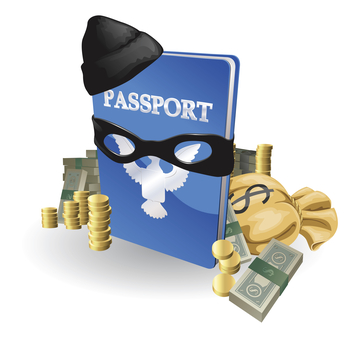 A few days ago I called American Express because I wanted them to send us a new Bluebird card, since we hadn’t been able to find the prepaid card we used in Europe.
A few days ago I called American Express because I wanted them to send us a new Bluebird card, since we hadn’t been able to find the prepaid card we used in Europe.
It turns out someone else used a fraudulent card with our number at an ATM last month, twice, each time withdrawing 50 euros.
We’d used the card since getting back, so we know it hadn’t been left behind. The thief had not only the card number but the PIN, so we suspect a skimmer was used to capture the information while we were abroad and the bad guys only recently decided to use it.
I’m delighted to say that, after a few false starts, I finally found an Amex employee who knew what she was doing, and the purloined amount was restored to a freshly-issued card.
Today, I got a letter that one of our credit card accounts had been frozen because of suspicious activity. It turns out someone impersonating me had called in to change our address to one in Winnetka, a nearby neighborhood in Los Angeles. Fortunately, Capital One froze the account before she could misuse it. We’ll have to be without a card for a few days while a new one is sent to us, but that’s the extent of our inconvenience.
These incidents underscored for me why it’s so much better to use credit cards (and the right prepaid card) in a world full of identity theft. If these thieves had gotten hold of my debit card, they could have drained our bank account and we’d be waiting to get the money back while transactions bounced right and left. That wait could be protracted if your financial institution questions whether fraud really occurred. With credit cards, you aren’t required to pay the disputed amount until the issuer completes its investigation.
Our recent brushes with fraud also underscore how important it is that Americans get the chip-and-PIN technology used in Europe and much of the rest of the world. Credit card issuers and retailers are in the process of transitioning slowly to this much more secure standard, starting with cards that have both a computer chip and the old-fashioned magnetic stripe. But the sooner we get to cards that must be used with a PIN for purchases, the better.
Some issuers publicly worry that we Americans will have a hard adapting to the new technology, which is absurd. It’s no harder to use a chip-and-PIN machine at a checkout register than it is to use an ATM. You stick your card in the little slot at the bottom of the checkout terminal, punch in your four-digit number and you’re done. And you’re also done with the vast majority of account takeover fraud.
We have 2 U.S.-issued credit cards to use in our household, and both now been issued with the chip & PIN technology. It was curious to me that no PIN information was provided separately like with ATM cards. So I went looking for information on either finding the default PIN, or how to set a PIN for these cards. Online within the issuer’s FAQ page, it was addressed and confirmed the cards were issued with the chip technology used in Europe, but that no PIN was necessary to use it. It cheerily indicated that when prompted at a retailer to enter the PIN to complete the transaction, just say “No PIN is needed”. So no default PIN is set for our cards, and no way to set a PIN. Wondering if this is the standard implementation of this technology for U.S. issuers, or if it is unique to ours (B of A VISA cards).
Yes, that’s the slow roll-out, which I think is annoying. There are true chip and PIN cards available from a few issuers. I’ll try to include a round-up later of what’s available now.
“It’s no harder to use a chip-and-PIN machine at a checkout register than it is to use an ATM.”
You’ve got to be kidding. First off, I don’t use ATMs because there is no cashback when I pay with cash. Second, with my ATM card, I can select a PIN that I’ll remember, and with credit cards, that is not a universal feature.
I guarantee that the reason the CC issues don’t want the PINs is because there is a percentage of people that just don’t want to have to remember them, and I’m one of them.
Your concern about fraud is unfounded. The UCC, Reg Z, and Reg E protect me from fraud, not PINs. You didn’t lose any money on your Bluebird or your Capital One card because of it, but inspite of your Bluebird needing a PIN, thieves were still able to get some money, but it didn’t come out of your pocket. The best that a PIN will do is limit losses to the bank, and who cares about them? However, it will inconvenience me, and that’s not something I’m going support.
I didn’t find it hard to memorize the PIN that came with our UNFCU card. And the Bluebird card was compromised because it has the old school magnetic stripe, which is easy for a skimmer to capture along with the PIN. If it had a chip, they’d just get the PIN, which would be useless by itself. Personally, I’m tired of having my accounts frozen, talking on the phone to fraud reps, and waiting for new cards. I want the new tech.